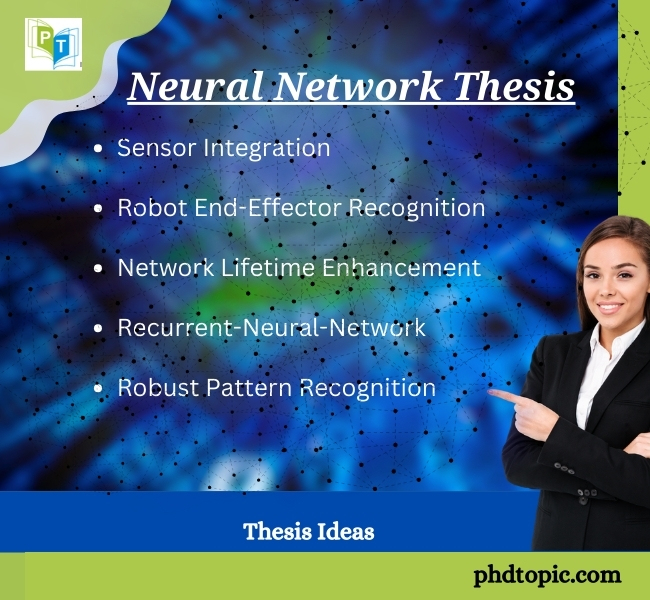In the domain of Machine Learning (ML), writing a thesis on neural networks that incorporates the extensive area of topics, starting from basic research on algorithmic advancements and network structures and finishing it by virtually applicable in several fields. Thesis under Neural Network takes time and patience moreover experts guide will be preferable to attain success. Innovative topic and methods on all Neural Network concept will be shared whereas our framework structure is different from others so we finish work on time and in fine quality.
An organized procedure for designing a thesis on neural networks is depicted here,
Title:
“Advancements and Applications of Neural Network Architectures in [Domain/Application]”
Abstract:
It is the brief summary and for the purpose of research it binds the inspiration, utilized methods, the main results and the consequences of the result.
Introduction:
- Background: In machine learning, it presents the neural networks, their improvements in past data and its importance.
- Problem Statement: The definite problem is illustrated or it stands against our thesis reports.
- Motivation: In what way the problem is significant for us to solve and the capable effect on the result is clearly justified.
- Objectives: The key objectives and aim of our research is declared obviously.
- Scope and Limitations: The area of our research and the boundaries are reviewed and sketched by us.
Literature Review:
- Theoretical Foundations: Current theories, models and ideas which support neural networks are discussed.
- State-of-the-Art: Examining the neural network architectures and their functions which are latest and trending.
- Gaps in Current Research: In the existing research, we detect the space or boundaries that are occupied by our thesis intents to overcome.
Methods:
- Research Hypothesis/Questions: For leading our exploration, the hypothesis or research questions are introduced.
- Research Design: Sketch the research design which involves the deployments of various neural networks, data collection techniques and systematic methods.
- Data Sources: Datasets are illustrated which are applied for the training and testing process of a network that incorporates other steps of preprocessing.
- Implementation: The neural network execution is described elaborately that includes the use of software, algorithms, and computational resources using computational resources.
Experiments and Results:
- Experimental Setup: The procedure of our experimentation process which consists of some definite structures of neural networks is illustrated by us.
- Results: This displays the outcome of the experiment. We describe the result by accomplishing tables, graphs, and charts.
- Discussion: The extracted results are observed and converse about in what way they overcome the research questions or assumptions.
Comparative Analysis:
- Once we agree with this system, then we contrast the proposed neural network model performance with current models or standards.
Conclusion:
- Summary: The key results and their consequences are recollected by us.
- Contributions: This emphasizes our contribution to the domain of neural networks and machine learning.
- Limitations and Future Work: The limitations of the work are recognized and the areas are recommended for future research.
References:
- This involves every academic work of an extensive list mentioned in the thesis.
Supplements:
- Additional resources are associated for assisting the thesis with code listings, supplement data or arithmetical demonstrations.
Neural Network Thesis Topics
A vital activity that scholars must face is selection of thesis topics it is difficult to choose the best topics as scholars may not have in depth research skills. When scholars face a lack of technical thesis support this part becomes more difficult.phdtopic.com serves as a best guide to select an apt Neural Network Thesis Topic from the help of professionals.
- Robot end-effector recognition using modular neural network for autonomous control
- Sensor Integration for Satellite-Based Vehicular Navigation Using Neural Networks
- Computer network connection enhancement optimization algorithm based on convolutional neural network
- Network Lifetime Enhancement of Homogeneous Sensor Network Using ART1 Neural Network
- The equivalence between fuzzy logic systems and feedforward neural networks
- Cost coefficient control method for solving optimization problems on Hopfield-type neural networks
- A learning method of nonlinear mappings by neural networks with considering their derivatives
- The efficiency analysis of the statistical feature in network traffic identification based on BP neural network
- Recurrent-Neural-Network-Based Boolean Factor Analysis and Its Application to Word Clustering
- Recurrent Neural Network for Non-Smooth Convex Optimization Problems With Application to the Identification of Genetic Regulatory Networks
- Robust pattern recognition using chaotic dynamics in Attractor Recurrent Neural Network
- New Algebraic Criteria for Synchronization Stability of Chaotic Memristive Neural Networks With Time-Varying Delays
- Intelligent robotic die polishing system through fuzzy neural networks and multi-sensor fusion
- Application of multi-layered feedforward neural networks in digital vibration control
- Coherence vector of Oriented Gradients for traffic sign recognition using Neural Networks
- VLSI design of compact and high-precision analog neural network processors
- Parametric feature-based voice recognition system using artificial neural network
- Existence and Uniform Stability Analysis of Fractional-Order Complex-Valued Neural Networks With Time Delays
- On the problem of applying AIC to determine the structure of a layered feedforward neural network
- Exponential synchronization of a class of neural networks with time-varying delays

